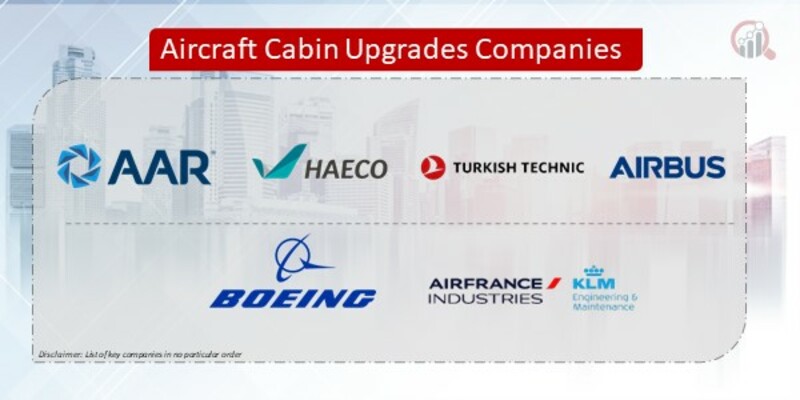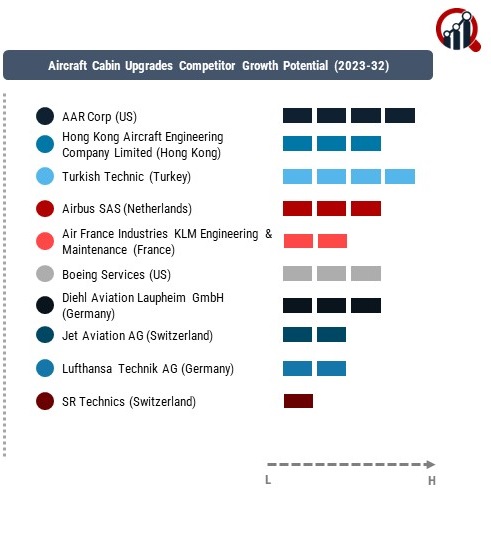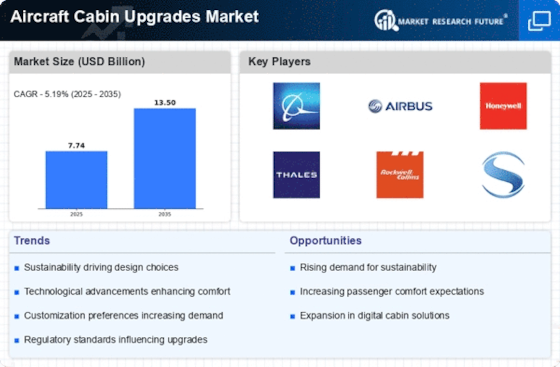Top Industry Leaders in the Aircraft Cabin Upgrades Market

Strategies Adopted: Key players in the Aircraft Cabin Upgrades Market deploy various strategies to maintain competitiveness and drive growth. These strategies include:
Product Differentiation: Offering a wide range of cabin upgrade solutions, including seating, in-flight entertainment systems, connectivity solutions, lighting, galley equipment, and lavatory enhancements, enables companies to differentiate their offerings and cater to diverse customer needs and preferences.
Customization and Personalization: Providing customized cabin interior designs, branding solutions, and passenger experience enhancements allows companies to meet airline requirements, align with brand identities, and create unique cabin environments that enhance passenger comfort and satisfaction.
Technology Integration: Incorporating advanced technologies such as wireless streaming, biometric authentication, mood lighting, virtual reality (VR), and augmented reality (AR) into cabin upgrades enhances the passenger experience, improves operational efficiency, and supports airlines' digital transformation initiatives.
Lifecycle Support: Offering comprehensive lifecycle support services, including design engineering, certification, installation, maintenance, and aftermarket support, enables companies to build long-term relationships with customers, maximize equipment uptime, and generate recurring revenue streams.
Key Companies in the Aircraft Cabin Upgrades market include
AAR Corp (US)
Hong Kong Aircraft Engineering Company Limited (Hong Kong)
Turkish Technic (Turkey)
Airbus SAS (Netherlands)
Air France Industries KLM Engineering & Maintenance (France)
Boeing Services (US)
Diehl Aviation Laupheim GmbH (Germany)
Jet Aviation AG (Switzerland)
Lufthansa Technik AG (Germany)
SR Technics (Switzerland)
Singapore Technologies Engineering Ltd (ST Engineering) (Singapore)
Factors for Market Share Analysis: Several factors influence market share in the Aircraft Cabin Upgrades Market, including:
Customer Relationships: Building strong relationships with airlines, aircraft lessors, OEMs, MRO providers, and aircraft owners through excellent customer service, technical expertise, and timely project delivery fosters customer loyalty, repeat business, and referrals, driving market share growth.
Industry Reputation: Establishing a reputation for quality, reliability, and innovation in cabin upgrade solutions, backed by certifications, awards, and customer testimonials, enhances brand credibility, market perception, and competitive advantage in the industry.
Regulatory Compliance: Ensuring compliance with aviation regulations, airworthiness standards, safety requirements, and certification processes, such as FAA, EASA, and CAAC regulations, is essential for gaining market acceptance, securing approvals, and maintaining regulatory compliance for cabin upgrades.
Cost Competitiveness: Offering competitive pricing, cost-effective solutions, and value-added services such as financing options, leasing programs, and bundled packages helps companies attract cost-conscious customers, win bids, and maintain market share in a price-sensitive market environment.
New and Emerging Companies: In addition to established players, new and emerging companies are entering the Aircraft Cabin Upgrades Market, bringing innovative technologies and solutions. Some notable new entrants include:
Greenpoint Technologies: Specializes in VIP and executive aircraft cabin completions, modifications, and refurbishments, offering custom interior designs, luxury amenities, and personalized cabin environments for private and corporate aircraft owners.
FACC AG: Develops lightweight cabin components, interior systems, and composite materials for commercial and business aircraft, focusing on cabin comfort, space optimization, and sustainability to meet evolving customer demands.
AIM Aviation (AVIC Cabin Systems): Provides cabin interiors, galleys, lavatories, and stowage solutions for commercial airlines and business jet manufacturers, offering modular designs, cost-effective solutions, and rapid turnaround times to meet tight project schedules.
Industry News and Current Investment Trends: Recent developments and investment trends in the Aircraft Cabin Upgrades Market reflect a growing demand for cabin modernization, passenger experience enhancements, and sustainability initiatives. Key highlights include:
COVID-19 Recovery: Airlines are investing in cabin upgrades, retrofits, and refurbishments as part of their post-pandemic recovery strategies to attract passengers, differentiate their products, and enhance onboard health and safety measures.
Sustainable Materials: Increasing adoption of sustainable materials, eco-friendly cabin components, and recyclable products in cabin upgrades to reduce environmental impact, minimize carbon footprint, and meet sustainability goals set by airlines and regulatory agencies.
Digitalization and Connectivity: Integration of digital technologies, wireless connectivity, and IoT solutions into cabin upgrades to enable personalized passenger services, data-driven insights, and real-time monitoring of cabin systems for improved operational efficiency and passenger satisfaction.
Overall Competitive Scenario: The Aircraft Cabin Upgrades Market is characterized by intense competition, technological innovation, and evolving customer demands. Established players with comprehensive service offerings, global reach, and strong industry partnerships maintain market leadership, while new entrants and emerging companies disrupt the market with niche solutions, agile business models, and customer-centric approaches. As the aviation industry continues to rebound from the pandemic and embrace digital transformation, companies that invest in innovation, customer engagement, regulatory compliance, and sustainability will remain competitive in the dynamic and evolving Aircraft Cabin Upgrades Market.












